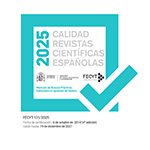From Historiographical Construction to Novelistic Representation: Ferdinand VII in the Light of Vayo and Galdós
Abstract
This article examines the impact of Romantic historian Estanislao de Kostka Vayo’s Historia de la vida y reinado de Fernando VII de España (1842) on Benito Pérez Galdós’ novel, La Fontana de Oro (1870), as well as on his second series of Episodios nacionales (1875-1879). My analysis centers around the different types of textual representation of Ferdinand VII that the authors resorted to: physical portrait (prosopography), moral portrait (ethopoeia), and political activity between 1814 and 1833. The fact that both of them shared the same creed, that of moderate liberalism, accounts for their very negative views on the monarch and, in general, on absolutism. However, the subtext of theirs works differs considerably from one another: while Vayo expressed a veiled optimism in the imminent accession of Isabel II to the Spanish throne, Galdós’s concern with the future of the Revolution of 1868 turned into utter disillusionment after its failure.
Downloads
Article download
License
In order to support the global exchange of knowledge, the journal Cuadernos de Historia Contemporánea is allowing unrestricted access to its content as from its publication in this electronic edition, and as such it is an open-access journal. The originals published in this journal are the property of the Complutense University of Madrid and any reproduction thereof in full or in part must cite the source. All content is distributed under a Creative Commons Attribution 4.0 use and distribution licence (CC BY 4.0). This circumstance must be expressly stated in these terms where necessary. You can view the summary and the complete legal text of the licence.











